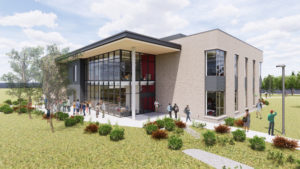Washington State University communities will have an opportunity to explore equity in scholarship, places, and all the spaces between, during the semi-annual Diversity, Equity and Inclusion Summit on Thursday, Feb. 27, 2-4 p.m., in the Compton Union Building (CUB) Junior Ballroom. The summit is open to everyone and will be available via zoom and livestream.
The summit’s theme, Spaces Between: Equity in Scholarship and Place, seeks to remind people that the work of equity and inclusion isn’t just happening within certain recruitment or retention programs in Student Affairs, for example, or in certain classes within Academic Affairs.
“We want people to see that this work exists in multiple ways, multiple places, and in every element of what we do here at WSU,” said Jaime Nolan, associate vice president for community, equity, and inclusive excellence. “Yes, it is taking place in those obvious places, but it’s also happening in all of the spaces between.” To help illustrate this point, the summit will feature four initiatives.
Equity in the built environment
WSU Tri-Cities is scheduled to break ground next month on what is currently called the Tri-Cities Academic Building. When planning for the building first began in 2013, it was intended to house classrooms and labs for science, technology, engineering and mathematics (STEM) disciplines. As new campus leaders became involved, and students became engaged in the planning process, the vision for the building drastically changed to make it useful and welcoming for students in all disciplines.
Kathleen McAteer, vice chancellor for academic affairs and clinical associate professor of Biology, and Ray White, vice chancellor of finance and administration, will talk about the design-build process and how it incorporated the concept of social justice in the built environment.
“The students gave us great ideas for how to make this building feel like a place that belongs to them,” McAteer said. “This experience will help guide future building projects on our campus.”

Another example of how space is having a big impact on the community will be presented by Zoe Higheagle Strong, WSU assistant professor of educational psychology, executive director of tribal relations, and special assistant to the provost/executive vice president. Higheagle Strong will showcase who is utilizing the Elson S. Floyd Cultural Center on the Pullman campus and the variety of ways it is facilitating celebration, education, and community building.
Building community through scholarship
Masha Gartstein, professor of psychology, will talk about ADVANCE at WSU, a program funded by the National Science Foundation to support women and diverse faculty in all disciplines, especially in science, technology, engineering, mathematics, and medicine.
Nolan said while the work in ADVANCE might focus primarily on gender, its ripple effect across the system benefits other underrepresented groups. She said it is important to learn about the program’s strategies, the impacts they are having, and plans for expansion.
The summit will also showcase a new initiative being developed by Aaron Agulay, assistant professor of music. Borrowing from a program he has seen in the Berwyn Heights area of Chicago called Project 88, Agulay is experimenting with how classical music can be a vehicle for bringing together diverse communities on the Palouse.
Project 88 is a model that revolves around an artist series, where composers representing many different underrepresented groups are invited to perform and teach their craft to locals. As a gay, Filipino classical singer, Agulay has performed in the series, and has seen how diverse audiences feel more connected to classical art when performed by diverse artists. He wants the WSU community to share in this experience.
“At the summit I’ll talk about how I want to create music that brings our different communities together—whether they be African Americans, Asian Americans, LGBTQ, or females,” Agulay said. “Once they become inspired, they will grab even more people and our community becomes more unified.”
Protest and praxis
Nolan and several other presenters from WSU will give a workshop at the National Conference on Race and Ethnicity (NCORE), May 26, in New York. Their presentation, titled “Protest as Praxis: Intersectional Coalition Building and Capacity for Dialogic Reflexivity,” will talk about experiences working with student demands around equity and inclusion, and how it led to the creation of five campus culture and climate working groups.
Joining Nolan will be Matthew Jeffries, director of the Gender Identity/Expression and Sexual Orientation Resource Center (WSU Pullman); Mark Beattie, associate vice chancellor for academic and student affairs and clinical assistant professor in the School of Hospitality Management (WSU Everett); Stephen Bischoff, director of Multicultural Student Services (WSU Pullman); and Merrianneeta Nesbitt, assistant director for the Office of Outreach and Education and instructor in sociology (WSU Pullman).
The Diversity, Equity and Inclusion Summit, among many initiatives, was born out of the work of the campus culture and climate working groups, which are working to advance diversity initiatives systemwide. Nolan will provide an update on the working groups during the summit.
Looking ahead to next fall’s summit, Nolan invites students, faculty and staff from across the WSU system to share ideas for event theme and presentation topics.






